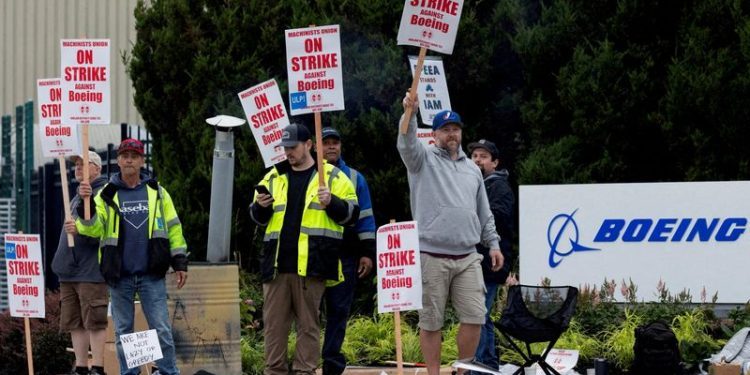By David Shepardson
(Reuters) -The Republican governors of Utah, Missouri and Montana on Tuesday urged Boeing (NYSE:BA) and the union representing 33,000 striking machinists to end a nearly seven-week-old strike citing the impact to their states and the planemaker’s suppliers.
“The strike has far-reaching implications in our states,” wrote Governors Spencer Cox, Mike Parson and Greg Gianforte to Boeing and the International Association of Machinists and Aerospace Workers (IAM).
“Boeing has stopped buying from most suppliers, most of whom are now making the very difficult decision to furlough or lay off their own employees,” they said.
Boeing and IAM declined to comment on the letter.
Separately, Ihssane Mounir, senior vice president of global supply chain for Boeing’s commercial airplanes unit, told hundreds of suppliers in an email on Tuesday seen by Reuters that the planemaker will need to continue a pause on shipping components for the 737, 767 and 777 programs.
“We understand this may drive you to take additional and difficult actions for your production schedules as well as for your teams,” Mounir wrote.
He added: “Our team will be in touch soon and we remain dedicated to continuing to work with you – part by part – to maintain as much stability in our shared production system as we can.”
Last week’s vote by 64% of Boeing’s West Coast factory workers against the company’s latest contract offer, further idling assembly for nearly all of the planemaker’s commercial jets, has created a fresh test for suppliers.
No new talks have been scheduled since the rejection.
Boeing’s vast global network of suppliers that produce parts from sprawling modern factories or tiny garage workshops, was already stressed by the company’s quality-and-safety crisis, which began in January after a mid-air panel blow-out on a new Alaska Airlines 737 MAX 9.
Boeing announced earlier this month plans to cut 17,000 jobsglobally – or 10% of its workforce – a one-year delay to a key new jet and other cuts. On Tuesday, the company said it had raised at least $21 billion in new capital.





